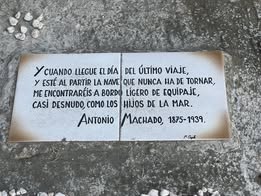Hormigas
A la cálida vida que transcurre canora
con garbo de mujer sin letras ni antifaces,
a la invicta belleza que salva y que enamora,
responde, en la embriaguez de la encantada hora,
un encono de hormigas en mis venas voraces.
Fustigan el desmán del perenne hormigueo
el pozo del silencio y el enjambre del ruido,
la harina rebanada como doble trofeo
en los fértiles bustos, el Infierno en que creo,
el estertor final y el preludio del nido.
Mas luego mis hormigas me negarán su abrazo
y han de huir de mis pobres y trabajados dedos
cual se olvida en la arena un gélido bagazo;
y tu boca, que es cifra de eróticos denuedos,
tu boca, que es mi rúbrica, mi manjar y mi adorno,
tu boca, en que la lengua vibra asomada al mundo
como réproba llama saliéndose de un horno,
en una turbia fecha de cierzo gemebundo
en que ronde la luna porque robarte quiera,
ha de oler a sudario ya hierba machacada,
a droga ya responso, a pabilo y a cera.
Antes de que deserten mis hormigas, Amada,
déjalas caminar camino de tu boca
a que apuren los viáticos del sanguinario fruto
que desde sarracenos oasis me provoca.
Antes de que mis labios mueran, para mi luto,
dámelos en el crítico umbral del cementerio
como perfume y pan y tósigo y cauterio.
Ants
To life’s melodious warmth that goes with excellence
Of woman without artifice, without pretence,
Unconquered pulchritude, saviour and lover
In the enchanted hour of careless rapture,
Rancour of ants is the response in my voracious veins.
The pestilential itching, the relentless formication,
Smarts to the silent well, the swarm of noise, the castigation,
Maize-flour, a dual trophy split between prolific breasts,
And the Hell that I believe in, the unlimited damnation,
The rattle of the final breath, the prelude of the nests.
But then my ants will cancel their embrace,
Flee my poor work-worn fingers, as one who
Abandons on the sand a cold bagasse.
Your mouth denotes erotic derring-do:
Your mouth, my rubric, food, and ornament -
With vibrant tongue, like a rogue flame that’s hurled
Out of a kiln, flaunting to all the world
In the rough season of the gale’s lament,
Where the moon eyes you up to turn a trick -
Shall smell of crushed-up greens and cerement,
Responsory and incense, wax and wick.
Before my ants abandon me, Amada, have them brave
Your lips and travel, travelling to cleanse
The journey-money, fruit of bloody stains
That aggravate me, from oases of the Saracens.
Before my lips shall perish, for my sackcloth you shall give
Them at the cemetery’s gate, the crisis-gate, to me,
For my bread and my perfume, poison and cautery.
